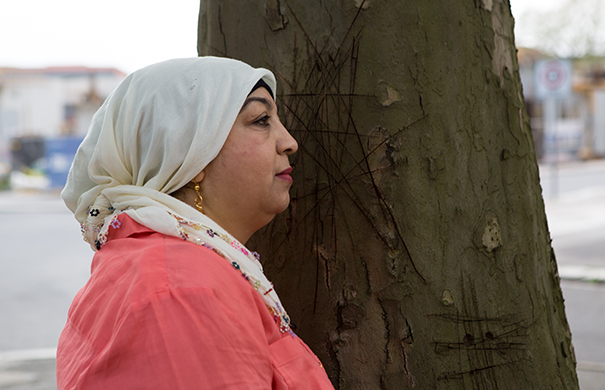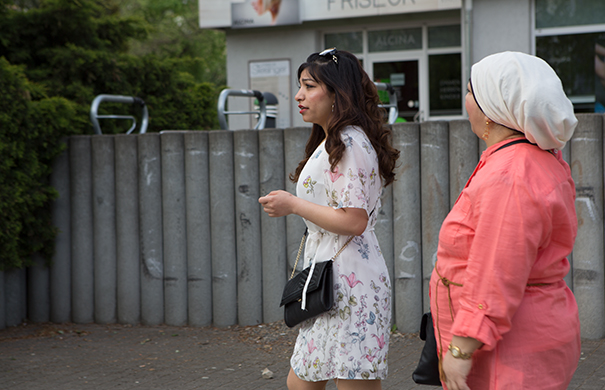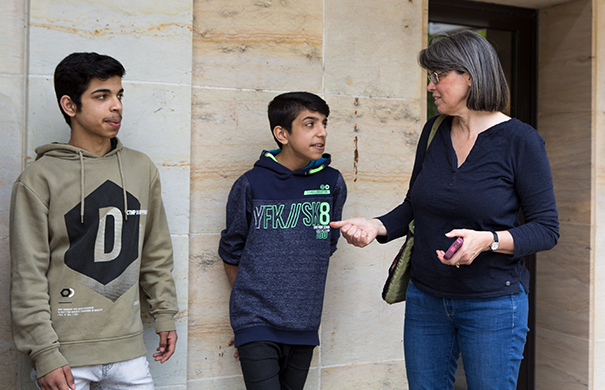
Ministry Updates
‘All This Will End’: A Refugee’s Story
June 20, 2018
by admin

It had been three days since Amal* lost her son in a bombing outside Aleppo. Not lost as in dead. Lost. Missing. Gone.
Kadan was playing in the street with his friends when a plane dropped a bomb on them. It killed two children and shot shrapnel through 11-year-old Kadan’s abdomen.
Kadan’s brother ran home to tell the family, but Amal wasn’t home. Rescue workers quickly loaded Kadan into an ambulance. By the time Amal got home and heard the news, her son was gone.
Amal rushed to the local hospital, but Kadan had already been transferred somewhere else. In his critical condition, he needed the best care possible. But no one could tell Amal where Kadan had been sent.
“I kept looking for him … for three days,” Amal says. “I looked for him in all the hospitals.”
At each hospital, the answer was the same: We don’t know where your son is.
Kadan had vanished.
A Peaceful Life Destroyed
When Amal thinks of Syria before the war, she has two words for it: “Our life was stable and calm.”
As a single mother of nine children, Amal faced hardships. But her large extended family was always by her side. In addition to working on a farm, Amal helped with her sister’s laundry business. And her family often got together, in good times and bad.
Maybe that’s how Amal stayed hopeful as her country began to crumble.
First, protests started disrupting transportation. Teachers couldn’t get to school, so the schools closed. Then electricity and water started going out. Grocery prices spiked. Then bombs began to fall.
Amal took her children out of Aleppo and moved from village to village, desperate to avoid attacks.
“We kept saying that all this will end, and everything will return to normal,” Amal says.
But as the violence increased, that was harder to believe.
Joyful family gatherings turned into mourning — for what had happened and what might come next. Amal worried about where she would take her children next. They didn’t have papers to emigrate.
And then one day, Amal’s great fear came true: Her youngest child was hit by a bomb, and no one knew where he was.
Fleeing to Turkey in the Night
After three days of searching hospitals, Amal finally found someone with answers: Her son had been sent to an intensive care unit in Kilis, Turkey.
The family still didn’t have emigration papers. They didn’t have a car. But there was no questioning what they would do next. Amal found a migration guide, and she and her children walked through the night to reach Turkey.
Kadan spent seven months recovering in the hospital. Then Amal and her five youngest children made the trek to Germany.
Fear in a New Nation

When Amal’s family came to Germany, Amal had to help her children build a new life — all in a language she didn’t know. Photo by TEAM
After a month in a German refugee camp, the family moved to Dresden. Located in eastern Germany, the city offered a great measure of peace. But creating a new life there was still difficult.
Amal had to register her kids for school, find her required German classes and register for asylum — all in a foreign language.
“I didn’t know where to go,” Amal says. “I would be lost if I passed two streets. I was scared because I didn’t know the language.”
Adding to the family’s troubles, the children’s school was over an hour away. It was hard on all the children, but especially on Kadan. He was still recovering from his injuries, and he struggled to make the daily journey.
In her distress, Amal poured out her problems to a fellow refugee, Mina. And as Mina listened, she realized she knew someone who could help.
A Helping Friend for Refugees
TEAM missionary Anne Ingram didn’t come to Dresden to help refugees. She came to plant a church with her husband. But as the refugee crisis grew, Anne knew she had to show God’s love to those in need.
She began helping out at a local community center. She talked with refugees in simple German while sharing meals or playing board games, gradually helping them learn the language. Then she started helping with more complex things, like opening bank accounts or even filing for asylum.
“When they come in, you can almost see the fear in their faces, and sort of this holding themselves back,” Anne says.
Anne drew from her missionary experience to make refugees feel safe. She knew what it was like to move to a strange land with a new language. She knew how it felt to send your kids to foreign schools.
But she also knew how to thrive in Germany — and she shared everything she’d learned with her new refugee friends.
Anne began working with a refugee from Somalia, who introduced her to an Iraqi refugee named Mina. And one day, Mina introduced Anne to a courageous refugee from Syria: Amal.
‘Fear is Gone’

Shrapnel injuries made Kadan’s hour-long commute to school miserable. But with TEAM missionary Anne Ingram’s help, he got into a school five minutes from home! Photo by TEAM
Anne quickly started working on Kadan’s school situation. She knew a doctor with a heart for refugees. After a check-up and a doctor’s note, Kadan was transferred to a school in his neighborhood.
Amal’s daughter Sibel speaks English, so Anne started working with her on the asylum process. Together, they tackled the required legal documents. And when the family was accepted, Anne helped them find an apartment — just five minutes from Kadan’s school.
“She helped me in everything,” Amal says. “Also, she facilitated all the legal papers. She helped me even in the house furniture. If I have a parents’ meeting at school, she comes with me. … In other words, we became one family, and I consider her a sister.”
The family’s struggles aren’t over yet. They’re still processing the great trauma they experienced. And while many Germans are welcoming, others insist they want nothing to do with outsiders. One anti-refugee group holds protests every Monday.
Despite all that, friends like Anne are helping the family overcome each new trial.
“I’m not running this major refugee center or anything, but [God’s] given me a family and some others that I get to love in Jesus’ name, and I feel like that’s what I do,” Anne says.
For the first time in years, Amal has hope that her kids will thrive in school and achieve their dreams. When they go outside to play, she doesn’t worry that they won’t come home.
“I feel safe,” Amal says. “Fear is gone.”
*Some names have been changed to protect the people in this story.
Related articles


